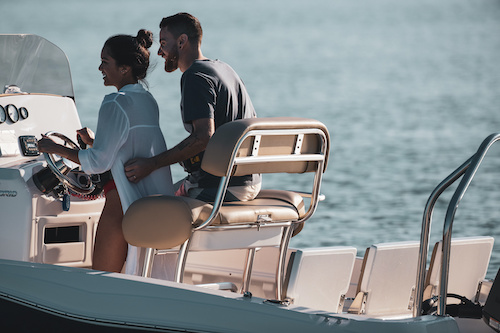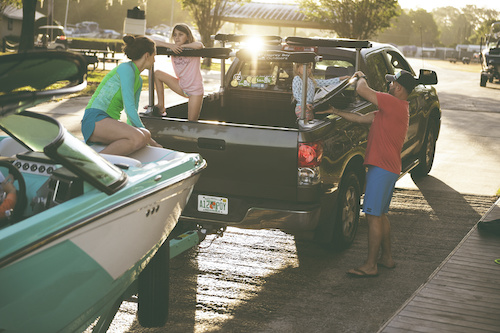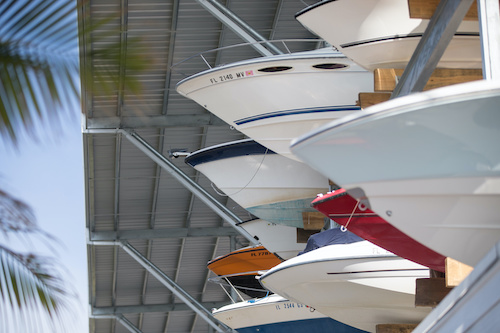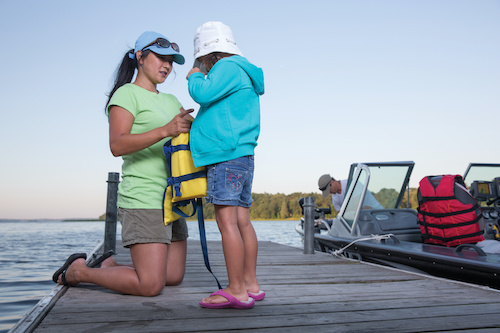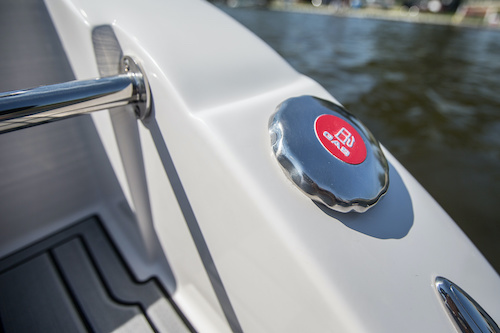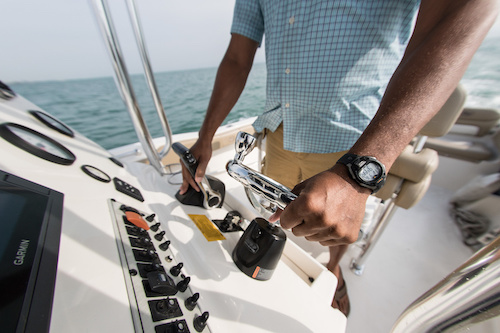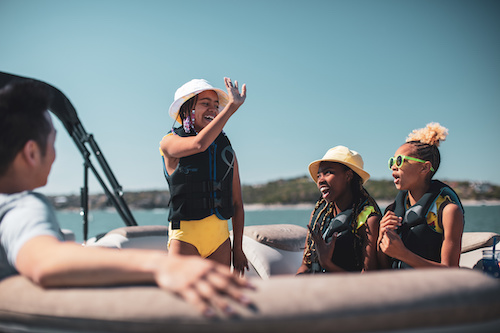First-Time Boat Owners: 10 Tips to Get Started
If you’re ready to join the fun on the water, buying a boat, whether new or pre-owned, is the first step. But there are a few details to consider before you turn the key. For all you first-time boat owners out there, follow this simple checklist with tips on how to help ease into ownership.
First-Time Boat Owner Checklist
- Secure boat insurance.
- Learn how to trailer your boat.
- Learn how to launch and retrieve your boat.
- Determine where you will store your boat.
- Understand basic maintenance requirements.
- Stock your boat with the proper equipment.
- Follow a pre-departure checklist.
- Master basic on-the-water operating skills.
- Always practice safe and responsibly boating.
- Enjoy your new boat!
12 Most Common Boating Mistakes & How to Avoid Them
Insuring Your Boat
You need to insure your boat, both for liability and for damage to the boat, and in that regard boat insurance is similar to the policy that covers your automobile.
It's important to understand that there are some types of coverage that are specific to boats.
- For example, a policy with specific fuel-spill liability protects you from clean-up claims or third-party damage caused by the accidental discharge of oil or fuel, if you boat were to leak fuel or sink in a marina.
- If you have an accident while towing, your boat policy may pay to repair or replace the trailer as well as the boat.
- If your trailer causes injuries to people or damage to property, your auto policy should cover the liability.
Check both policies to make sure you are covered. Other factors to consider are special requirements for boats in hurricane zones, boats leaving U.S. waters, and boats traveling far from shore.
Get a Boat Insurance Quote from Progressive
Towing & Trailering Your Boat
Trailering you boat makes it possible to visit new bodies of water, but for many new boat owners towing safely requires another new skill set that is part of boat ownership.
Your Tow Vehicle
The first item to check is that your tow vehicle is rated to tow the boat you will buy.
- Check the vehicle owner’s manual carefully to find the maximum tow rating, and the Gross Combined Vehicle Rating (GCVR), which is the weight of the tow vehicle and the boat and trailer; and that weight should include the weight of boat fuel, water and gear.
- Don’t buy a boat only to discover you’ll need a new truck to tow it.
Insurance Coverage for Roadside Assistance
You may also want to consider getting insurance coverage for roadside assistance, in case your tow vehicle breaks down while trailering your boat. Progressive’s Roadside Assistance, for example, provides 24/7 coverage including towing, jump starts, winching, fuel delivery, vehicle lockout, and flat tires.
Pro Tip: If your boat sways from side to side when trailering, pull over and redistribute the load. Swaying is very dangerous, and usually results from improper tongue weight (the amount of weight on the trailer tongue where it hitches to the tow ball on your vehicle). In most cases, tongue weight should be 10 to 15 percent of the overall package weight.
Launching & Retrieving
The boat launch ramp has its own etiquette (be sure to read Boat Ramp Etiquette 101 to learn more), developed to keep things moving smoothly even on the busiest weekend morning. Knowing the drill will help you keep your stress level down and get your day on the water off to a great start.
Pro Tip: Learning to back a boat down the ramp is one of the most stressful parts of becoming a new trailer-boater—remember, practice makes perfect. Before you had for the ramp tow your boat to a large, open parking lot where you can practice backing up for an hour or two without worrying about blocking other boaters from the ramp or running into any obstructions. If the pavement isn’t lined, you can set up a “launch” of sorts by laying your life jackets out on the lot and using them as traffic cones.
Boat Storage
You might store your new boat on its trailer, but where will you park it? Not all communities permit boats to be parked-long-term in a residential driveway. Will your boat trailer fit in your garage? Maybe you need a trailer with a swing-away tongue. There are many other boat-storage options, from a dry stack valet service to mooring in a marina.
Pro Tip: If your boat will be stored outside, invest in a good cover. Keep the boat protected from UV rays and weathering, and it’ll look much better a few years down the road.
Boat Storage: What Are My Options?
Basic Boat Maintenance
Powerboats and personal watercrafts (PWCs) will require at least annual basic engine maintenance, usually an oil and filter change and a fuel filter change, a change of gearcase lubricant, and visual inspections of the propeller, steering system, and trim/tilt systems. If you live in a cold climate the boat will also need to be “winterized” for off-season storage.
Pro Tip: The most basic form of boat maintenance is also one of the most important: keeping your boat clean. This isn’t merely a matter of vanity and looks. Gel coat that’s not kept clean and protected by wax will become chalky and oxidized, and dirt and grime inside a boat can work its way into pumps, drains, hinges, and other moving parts, where it then causes damage.
Even if you take perfect care of your boat, mechanical difficulties are still a possibility, so it’s also wise to consider signing up for on-water towing coverage, like the Sign & Glide service from Progressive.
Basic Boat Maintenance Checklist for New Boaters
Basic Equipment
Of course, you’ll need life jackets (also called personal flotation devices, or PFDs) for every person onboard, but what other items are you required to keep on the vessel? There’s an entire list of required equipment, plus gear that goes beyond the requirements and is always good to have aboard. Check out our Boat Safety Checklist & Safety Equipment, to get the full scoop.
There are also items that often are not part of a new-boat purchase, including dock lines and fenders, to protect the side of the boat when it’s docked, that you may need to invest in.
Pro Tip: As well as equipping your boat, make sure you’re personally equipped for nautical conditions. If you’ll be boating in the off-season remember that it’s colder on water than it is on land, and regardless of seasonality if the weather is iffy you should always have good foul weather gear available for all the boat’s passengers.
Boat Essentials: What Supplies Do I Need for My New Boat?
Pre-Departure Checklist
A pilot always files a flight plan before takeoff and you should file a “float plan” with family or friends ashore before heading out for the day, just so someone knows where you are headed and when you expect to return. Check out our Pre-Departure Checklist for more “pre-float” ideas designed to help make your day on the water safe and enjoyable.
Pro Tip: If you’ve never filed a float plan before and want an example of what one should look like, use the US Coat Guard Auxiliary sample float plan.
What Should Be Included on a Float Plan?
Fueling
Gas gauge getting low? It’s time to re-fuel your boat, which presents two areas of concern.
What Fuel Should You Use for Your Boat?
The first is putting the correct fuel in your boat. Consult your owner's manual for any fuel octane requirements, and note especially that must marine engines may not use motor fuel with more than 10 percent ethanol (E10). You won’t see the higher-content E15 (sometimes generically called “regular 88”) at many on-the-water stations, but if you fill a trailer-boat on the road, look closely for an orange and black sticker on the pump identifying ethanol content, before filling up.
To learn more about issues with ethanol and marine engines, go to Choosing the Right Fuel and Oil for your Marine Engine.
Fuel Spills
You’ll also want to refuel while avoiding spills, even a few drops.
Pro Tip: Some boats may overflow fuel if you wait for the pump to shut off automatically. Instead, listen to the hiss of the fuel rushing into the tank. Usually, you’ll hear the fuel gurgling to the top just before it’s full, and can shut off the pump before overflow becomes a possibility.
Green Boating Tips: 10 Best Practices for Boaters
Operating Your Boat
If you buy a new boat, a good dealer should give you a thorough walk-through of the boat to show you how all the systems work. Some dealers will even take you out on the water for a demonstration run. But there’s more to operating a boat than knowing how to start the engine and steer the wheel.
Get a solid foundation on boat handling and docking, rules of the road and navigation by taking a boating education or safety course, as offered by your state or through one of the resources listed on How to Get a Boating License.
Pro Tip: Most people pick up on the basics of operating a boat quickly, but if you want to jump-start your learning curve, you can always consider chartering a boat that has a captain and/or crew. For many people, it’s a valuable learning experience.
Safe & Responsible Boating
Safe boating is always fun boating for everyone. Consider taking a boating safety and education course such as those offered by the US Coast Guard Auxiliary, or by your state or local authorities. You can find out more by visiting our Safe Boating Guide.
Pro Tip: Different boating activities can raise some different safety concerns.
- If you plan on fishing, be sure to check out Fishing Safety Tips.
- Sailors will want to see the Sailing Safety Guide.
- And watersports enthusiasts will want to take a look at our Watersports Safety Guide.
10 Tips to Recreate Responsibly While Boating & Fishing
Enjoying Your Boat
You’ve got your boat, and all of your gear. You’ve launched and are head away from shore…now what?
There are dozens of ways to make the most of your time on the water—fishing, tubing, skiing and boarding, diving, cruising and camping. Or just drop the anchor in a secluded cove and hang out. The trick is to fit boating to your lifestyle, whether you’re a single with friends, a family, or just looking for a little peace and quiet. A boat a great way to get there.
Pro Tip: There’s one sure-fire way to enjoy your boat: get out on the water, and use it! Do so, and you’ll discover that it’s almost impossible not to enjoy yourself.
First-Time Boat Owners FAQs
What should I keep in my boat?
Check out Boat Essentials: What Supplies Do I Need for My New Boat?
What is a pre-departure checklist?
It’s a quick list of gear, safety and comfort items you want to make sure you have on board before you cast off for the day. Our Pre-Departure Checklist has good information for all boaters.
What should I take on a boat for a day?
This Boat Safety Checklist & Safety Equipment and the Pre-Departure Checklist have you covered.
Where do I store my boat?
That depends on the size of your boat, your circumstance, and how you want to use the boat. For ideas on storage, go to Boat Storage: What Are My Options?
What type of vehicle do I need to tow my boat?
The tow vehicle needs to match the size and weight of the boat and trailer, and the terrain you plan to cover. For more information on towing, go to Boat Towing & Trailering.
What happens if my boat breaks down?
The average towing fee in the U.S. is about $700, according to BoatUS, and many boat insurance policies today offer some kind of on-water towing endorsement. Know the details of that coverage.
Read Next: Owning a Boat 101: The Boat is Just the Beginning
You May Also Like:
- 10 First-Time Boating Tips for New Boaters
- Basic Boat Trailer Maintenance Checklist
- 5 Smart Ways to Make Money with Your Boat
- How to Anchor a Boat
- Find the Right Boat for Your Lifestyle
Editor's Note: Promotional consideration for this article was paid by Progressive Insurance. This article was originally published in July 2019 and updated in February 2021.
